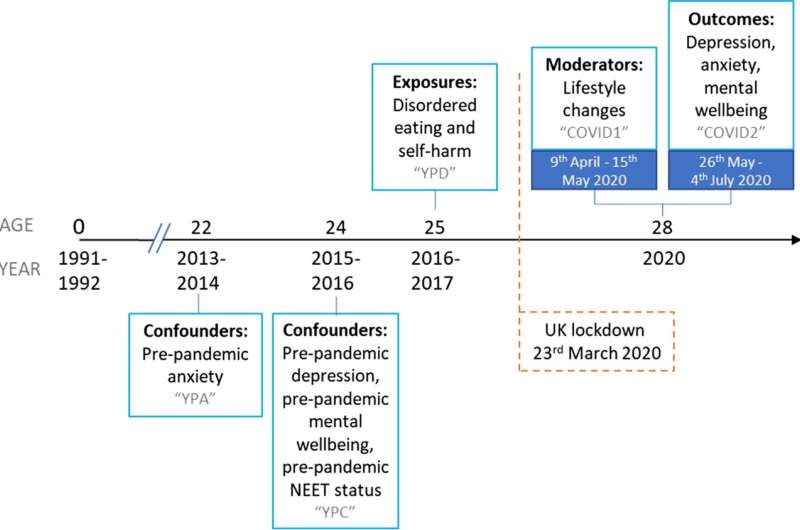
Young adults with previous self-harm or eating disorders reported higher levels of depression and anxiety during the pandemic, even when restrictions had eased, according to new research.
The study, led by the University of Bristol and funded by Elizabeth Blackwell Institute, Medical Research Council and Medical Research Foundation, has been published in the Journal of Eating Disorders. It looked at questionnaire information for 2,657 individuals from world-renowned health study Children of the 90s (also known as the Avon Longitudinal Study of Parents and Children) before and during the COVID-19 pandemic.
Researchers analyzed the relationship between previous reports of eating disorder symptoms and self-harm before the pandemic, and mental health problems (symptoms of depression and anxiety) and mental wellbeing during the COVID-19 pandemic. The study also assessed whether lifestyle changes, such as more sleep, relaxation techniques, or visiting green space, could be linked to mental health and wellbeing in young adults with and without previous eating disorder symptoms or self-harm.
Researchers studied questionnaire data from 2017, when the participants were then aged 25 years, as well as data taken during the pandemic in 2020.
At age 25, 32 percent of the 2,657 young adults reported at least one eating disorder symptom, 9 percent reported self-harm, and 5.5 percent reported both an eating disorder symptom and self-harm in the last year.
During the pandemic, those with previously reported eating disorder symptoms and/or self-harm had more symptoms of depression and anxiety, and worse mental wellbeing, compared to individuals without previous symptoms. This remained the case after adjusting for their pre-pandemic levels of depression, anxiety and mental wellbeing.
Lifestyle changes appeared to have little effect on the increased risk for mental health problems in those with prior eating disorder symptoms or self-harm.
Lead author Dr. Naomi Warne, Senior Research Associate at the University’s Centre for Academic Mental Health, said: “Eating disorders and self-harm are common and troubling mental health problems among young adults. In the UK, approximately 1.25 million people are living with an eating disorder and almost 1 in 15 adults report self-harm.
“Our research has highlighted individuals with prior self-harm and eating disorder symptoms are key risk groups and further longitudinal research is needed to understand their ongoing mental health as well as risk and protective factors.
Source: Read Full Article
